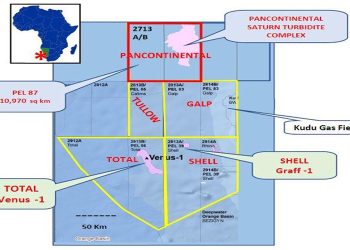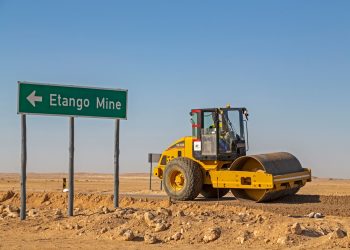
KAESO Energy Services has emerged as a key oilfield services provider in Namibia, with its operational base in Lüderitz playing a pivotal role in supporting offshore drilling activities by major exploration firms including TotalEnergies, Rhino Resources, and Galp.
Managing Director Jorge De Morais confirmed that the company is currently involved in every well drilled by these operators.
“We’ve been involved in every well drilled by TotalEnergies, Rhino Resources, and Galp. Beyond operators, we work with international service companies such as Schlumberger, which uses our Lüderitz base,” he said.
In response to growing offshore activity, KAESO made a strategic move in late 2021 by acquiring land in Lüderitz to establish a local base.
“We understand that TotalEnergies has been actively drilling in Namibia’s offshore waters, with strong indications of a potential discovery. In response, at the end of 2021, we made a strategic decision to acquire land in Lüderitz. That decision marked a turning point for us,” said De Morais.
By 2023, KAESO had begun redeveloping the site, replacing outdated fishing infrastructure with purpose-built oil and gas facilities. These now include specialised workshops, open storage yards, and equipment cleaning areas designed to meet environmental compliance standards.
“By 2024, our operations started gaining momentum, especially due to increased activity from TotalEnergies. There was growing pressure from both the Namibian government and TotalEnergies for service companies to establish a local presence in Lüderitz,” he added.
KAESO was the first and, at the time, only oil and gas service company to establish an operational footprint in Lüderitz.
“Several international service providers approached us for space, which we provided to enable their operations,” De Morais said.
The company’s investment in the Lüderitz base is estimated between US$2.5 million and US$4 million, with a strong emphasis on local content.
Despite initial concerns about the availability of skilled local labour, De Morais said Namibia had surpassed expectations.
“There was some scepticism initially around the availability of skilled labour in Namibia. However, what we found was quite the opposite. Namibia has a strong technical foundation, particularly in the mining, fishing, construction, and vessel repair sectors,” he stated.
KAESO currently employs 12 staff in Lüderitz and 20 nationwide, all trained in high-precision oilfield operations such as hydraulic pressure testing, equipment assembly, and offshore lifting.
“Our first Namibian engineering technician is now being trained to operate offshore tools. After six months of intensive training in our workshop, he is set for a second phase of offshore training in Angola,” De Morais said.
The company’s core services in Namibia include downhole tools, asset management, equipment maintenance, and consulting.
It also manages over 2,000 cargo containers in the region and provides logistical and technical support to multinational clients like Schlumberger and Halliburton.
De Morais said KAESO’s long-term strategy centres on sustainable local value creation.
“Our strategy considers four pillars of local development: who owns the assets, who builds them, who operates them, and who benefits from them. We’ve invested in land and infrastructure in Namibia, used local contractors, and built our team with Namibian talent,” he said.
Currently, only two of the company’s 20 employees are expatriates, with plans underway to expand operations further in Lüderitz, with Walvis Bay also under consideration as a second operational hub to support anticipated full-scale development phases.
“Namibia has one of the most organised ports in the region and a highly functional road network. This positions Namibia not only as a national hub but also as a strategic regional logistics centre,” said De Morais.
In addition to its Namibian and Angolan operations, KAESO is also entering the South African market.
“Our commitment is to grow with Namibia. We aim to create a sustainable, value-driven oil and gas ecosystem that supports local talent, builds world-class infrastructure, and strengthens Namibia’s position as a regional energy leader,” he said.







